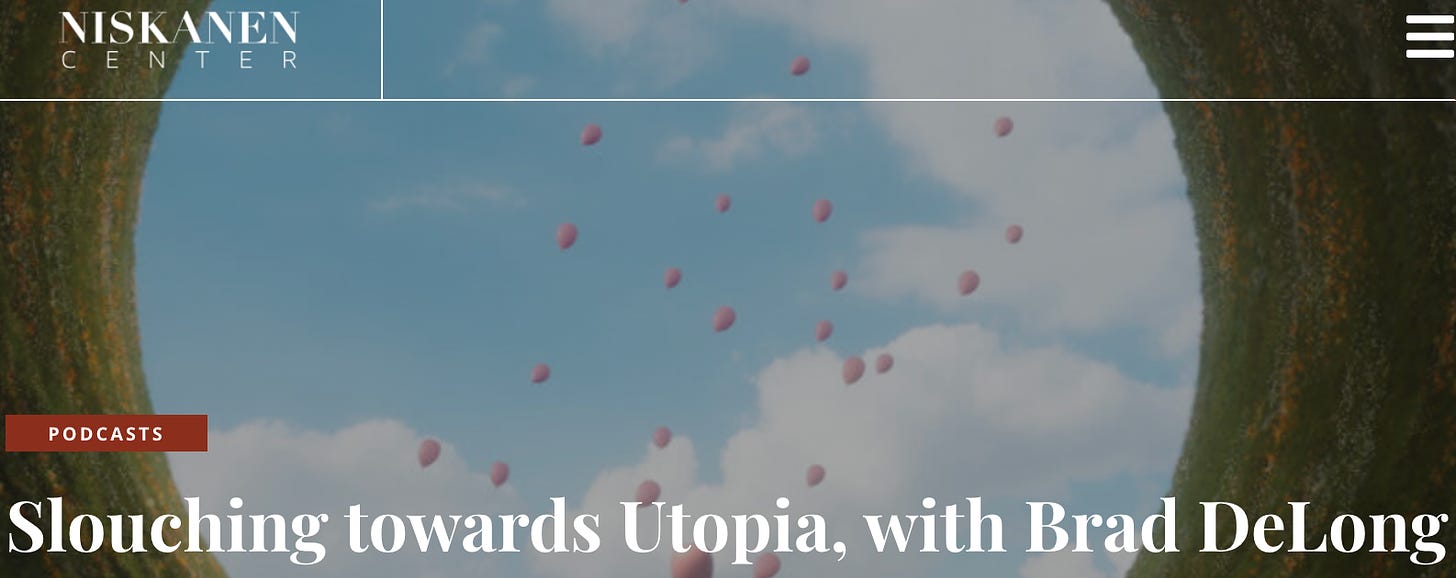PODCAST: Vital Center: Reflections on "Slouching Towards Utopia"
Slouching Towards Utopia: <http://bit.ly/3pP3Krk>
Vital Center Podcast Episode: <https://www.niskanencenter.org/slouching-towards-utopia-with-brad-delong/>
Vital Center Podcast: <https://www.niskanencenter.org/the-vital-center-podcast/>
The Long 1870-2010 20th Century saw the unprecedented explosion of material wealth through technological innovation, and social transformation—driven by industrialization, globalization, democracy, science, and education—and the singular failure to manage enormous challenges and conflicts to use our immense technological prowess and material abundance to build a satisfactorily human world.
DeLong’s principal lessons and implications for the future are:
Economic growth at visible and useful scale is not inevitable or automatic, but depends on the very sensitive adjustment of institutions so that humans make the right choices
The current slowdown in productivity growth and innovation may indicate that we have exhausted the low-hanging fruits of technological progress.
Much if not all of the increased prosperity from the technological dividend that we would expect from innovation and investment over the next two generations will be eaten up in the attempt to neutralize the damage that will be done by global warming.
Humanity has done a bad job at handling Schumpeterian creative-destruction in the age when there were enormous carrots in the form of increased wealth to be handed out to grease the wheels of progress. How will it do when there are no carrots, but rather hundreds of millions of climate refugees?
Plus increasing polarization, populism, and fascism in politics is undermining the social cohesion and trust necessary for sustaining rapid economic growth.
And how do we need to rethink our values and goals in light of the challenges and opportunities posed by artificial intelligence, climate change, biotechnology, and globalization?
MOAR Questions to think about:
Is “modernity” really a progressive state of mind that values rationality, science, democracy, and human rights? Is that too Eurocentric a view? Or, conversely, is that too universalistic a view?
Is DeLong simply high on his own supply in viewing the U.S. role in the 20th century as largely that of semi-benevolent hegemon?
Was neoliberalism was a necessary and beneficial response to the stagflation and economic crises of the 1970s and 1980s?
How big were the negative effects of neoliberalism on inequality, social cohesion, and democracy—to what extent is it an innocent bystander that just happened to be present at the scene of the crime?
Is DeLong’s negative judgment of neoliberalism inside and positive judgment of neoliberalism outside the Dover-Circle-Plus accurate and sustainable?
Are Hayek and Polanyi really two opposing thinkers on the market and the state? Or are they actually very very close—with the real possibilities and issues being much, much broader, with Hayek/Polanyi simply the location of a historically-specific trench line?
Can we be optimistic about the human potential for overcoming difficulties and creating a better world? Or will global warming, artificial intelligence, an biotechnology in a political context of resurgent populist fascism overmaster us in the end?

